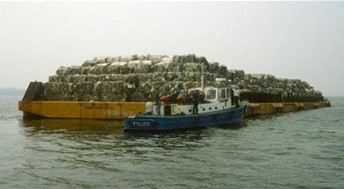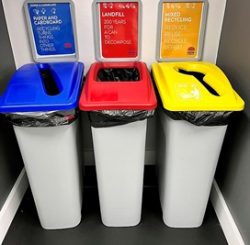
Big Business, Big Impact: ComEd
ComEd’s dedication to the environment is reflected in our policies, our sponsored initiatives and our efforts to reduce our carbon footprint. In fact, for our 2020 efforts ComEd was one of only 11 companies nationwide that was recognized for its outstanding recycling and waste management practices in 2021 by the U.S. Environmental Protection Agency (EPA) WasteWise program.
WasteWise is part of EPA’s sustainable materials management efforts, which promote the use and reuse of materials more productively over their entire life cycles.
Initiatives to develop better waste management practices in the U.S. all started with the infamous Long Island Barge, Mobro 4000, and tugboat, Break of Dawn, in 1987. The sea vessels, piled with tons of garbage and rubbish spent more than eight weeks wandering in the ocean in search of a place that would accept its waste. Three countries and six states denied it, eventually sparking a national waste management movement.
Fast forward to January 1994. The U. S. EPA launched WasteWise—a partnership program designed to help businesses, government and non-profit organizations find practical methods for reducing municipal solid waste.

ComEd is committed to doing its part to help manage and reduce waste at its facilities year-round.
The company continually seeks innovative solutions to go beyond compliance regulations and requirements. In 2020, ComEd expanded its pilot compost program to include a fourth site aiming to recycle everything it could and compost organics, such as food scraps, when possible. Additionally, ComEd trialed dumpster cameras by installing them at two sites to see what was tossed away and identify recycling opportunities as well as right-sizing and scheduling dumpster services.

ComEd’s office recycling program alone, in 2020, saved approximately 7.66 million kilowatt-hours of electricity, 210,338 gallons of oil, 12.04 million gallons of water, 6,019 cubic yards of landfill airspace, 20,637 mature trees, and accounted for 5,469 metric tons of total greenhouse gas reduction (the equivalent to 620,813 gallons of gas saved or 1,002 passenger cars not driven).
ComEd strives to not only act responsibly but also to serve in a leadership capacity in addressing the environmental challenges that impact our company and our stakeholders.
“We continually assess our performance by tracking and measuring our waste stream to reduce waste in our operations and reduce the impact it has on our communities,” said Neena Hemmady, vice president of Support Services at ComEd. “Waste reduction is an integral part to not only preserving natural resources, but also reducing greenhouse gas emissions that contribute to the global climate crisis.”
As WasteWise partners, ComEd takes pride in contributing to the prevention of 494 billion pounds of materials going to landfills or incineration, since the inception of WasteWise in 1994.
You can help make an impact too! See what’s recyclable, what’s not, and how to handle the tricky stuff by visiting Recyclebycity.com/chicago.
